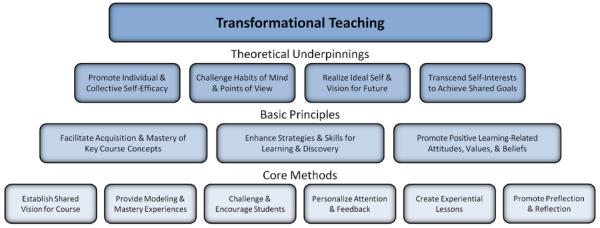Fig. 1.
Theoretical underpinnings, basic principles, and core methods of transformational teaching. Transformational teaching is an approach to classroom instruction that involves increasing students’ mastery of key course concepts while transforming their learning-related attitudes, values, beliefs, and skills. The approach is rooted in social cognitive theory (e.g., instructors promote students’ individual and collective efficacy), transformative learning theory (e.g., instructors challenge students’ habits of mind and points of view), intentional change theory (e.g., instructors help students’ realize their ideal self and vision for the future), and transformational leadership (e.g., instructors motivate and empower students to transcend self-interests to maximize their potential and achieve shared goals). These theoretical perspectives can be distilled into three basic principles, which include: facilitating students’ acquisition and mastery of key course concepts, enhancing students’ strategies and skills for learning and discovery, and promoting students’ positive learning-related attitudes, values, and beliefs. Instructors accomplish these goals by establishing a shared vision for a course, providing modeling and mastery experiences, challenging and encouraging students, personalizing attention and feedback, creating experiential lessons that transcend the boundaries of the classroom, and promoting ample opportunities for preflection and reflection. These methods are synergistically related and, when used together, maximize students’ potential for intellectual and personal growth

